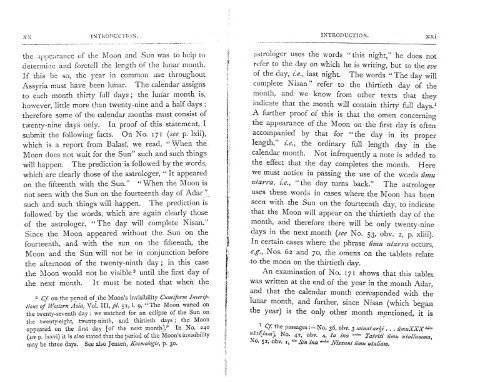%u3ac't %Seuitic ert f 'aunlation Voeries.
%u3ac't %Seuitic ert f 'aunlation Voeries.
%u3ac't %Seuitic ert f 'aunlation Voeries.
You also want an ePaper? Increase the reach of your titles
YUMPU automatically turns print PDFs into web optimized ePapers that Google loves.
x X N TIO 0U ) C ) N.<br />
thle a:i.i,'eara' . of fce thie MToon and Sun was to help to<br />
determini e and foretell the lengthL of the lunar month.<br />
If this be so, the yaear in common use throughout<br />
Assyria must have been lunar. The calendar assigns<br />
to each month thirty full days; the Junfar month is,<br />
however, little more than twenty-nine and a half days;<br />
therefore some of the calendar months must consist of<br />
twenty-nine days only. In proof of this statement, I<br />
submit the following facts. On No. 171 (see p. lxii),<br />
which is a report from Balasi, we read, "When the<br />
Moon does not wait for the Sun" such and such things<br />
will happen. The prediction is followed by the words,<br />
which are clearly those of the astrologer, " It appeared<br />
on the fifteenth with the Sun." "When the Moon is<br />
not seen with the Sun on the fourteenth day of Adar"<br />
such and such things will happen. The prediction is<br />
followed by the words, which are again clearly those<br />
of the astrologer, "The day will complete Nisan."<br />
Since the Moon appeared without the Sun on the<br />
fourteenth, and with the sun on the 'fifteenth, the<br />
Moon and the Sun will not be in conjunction before<br />
the afternoon of the twenty-ninth day; in this case<br />
the Moon would not be visible 2 until the first day of<br />
the next month. It must be noted that wheh the<br />
2 Cf on the period of the Moon's invisibility Cuneiform ]zscriptions<br />
of TVeslern Asia, Vol. III, . 51, . 9, " The Moon waned on<br />
the twenty-seventh day: we watched for an eclipse of the Sun on.<br />
the twenty-eight, twenty-ninth, and thirtieth days; the Moon<br />
appeared on the first day [of the next month]." In No. 240<br />
(see p. lxxvi) it is also stated that the period of the Moon's invisibility<br />
may be three days. See also Jensen, Kosmologie, p. 30.<br />
INTRODUCTION. xxi<br />
A astrologer uses the words "this night," he does not<br />
refer to the day on which he is writing, but to the eve<br />
of the day, i.e., last night. The words " The day will<br />
j complete Nisan" refer to the thirtieth day of the<br />
month, and we know from other texts that they<br />
indicate that the month will contain thirty full days. 1<br />
A further proof of this is that the omen concerning<br />
the appearance of the Moon on the first day is often<br />
accompanied by that for "the day in its proper<br />
length," i.e., the ordinary full length day in the<br />
calendar month. Not infrequently a note is added to<br />
the effect that the day completes the month. Here<br />
we must notice in passing the use of the words mrnt<br />
i zitarra, i.e., "the day turns back." The astrologer<br />
uses these words in cases where the Moon has been<br />
seen with the Sun on the fourteenth day, to indicate<br />
that the Moon will appear on the thirtieth day of the<br />
month, and therefore there will be only twenty-nine<br />
days in the next month (see No. 53, obv. 2, p. xliii).<br />
In c<strong>ert</strong>ain cases where the phrase 2mu t zarr occurs,<br />
e.g., Nos. 62 and 70, the omens on the tablets relate<br />
to the moon on the thirtieth day.<br />
j. AAn examination of No. 171 shows that this tablei<br />
was written at the end of the year in the month Adar,<br />
and that the calendar month corresponded with the<br />
lunar month, and further, since Nisan (which began<br />
the year) is the only other month mentioned, it is<br />
jf 1 Cf the passages:--No. 36, obv. 3 minat arni . . z.muXXX k"'<br />
i<br />
J<br />
al[lam], No. 42, obv. 4, sa ina a"' 2a Tarii u2mzu uiallamma,<br />
No. 52, obv. I, i' l Sin ina ar h NAisanni imu ugaHiam.

















